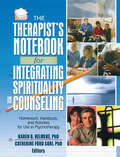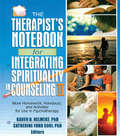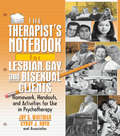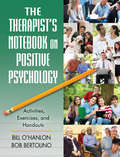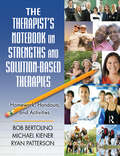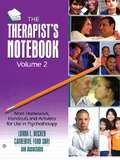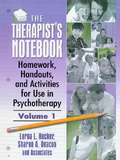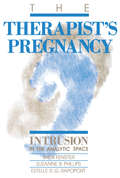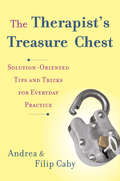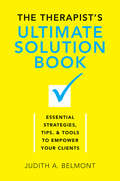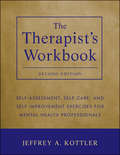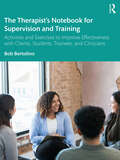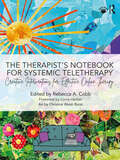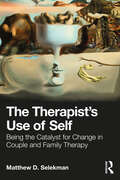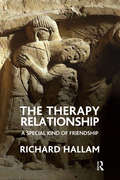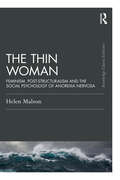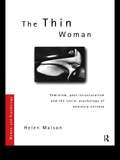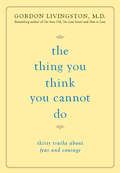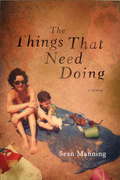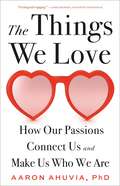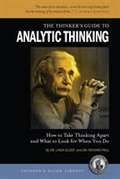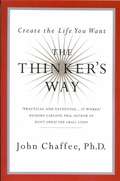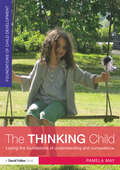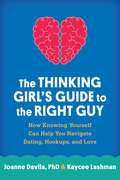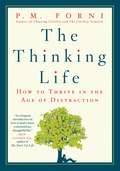- Table View
- List View
The Therapist's Notebook for Integrating Spirituality in Counseling I: Homework, Handouts, and Activities for Use in Psychotherapy
by Catherine Ford Sori Karen B. HelmekeLearn to initiate the integration of your clients’ spirituality as an effective practical intervention. A client’s spiritual and religious beliefs can be an effective springboard for productive therapy. How can a therapist sensitively prepare for the task? The Therapist’s Notebook for Integrating Spirituality in Counseling is the first volume of a comprehensive two-volume resource that provides practical interventions from a wide range of backgrounds and theoretical perspectives. This volume helps prepare clinicians to undertake and initiate the integration of spirituality in therapy with clients and provides easy-to-follow examples. The book provides a helpful starting point to address a broad range of topics and problems. The chapters of The Therapist’s Notebook for Integrating Spirituality in Counseling are grouped into five sections: Therapist Preparation and Professional Development; Assessment of Spirituality; Integrating Spirituality in Couples Therapy; Specific Techniques and/or Topics Used in Integrating Spirituality; and Use of Scripture, Prayer, and Other Spiritual Practices. Designed to be clinician-friendly, each chapter also includes sections on resources where counselors can learn more about the topic or technique used in the chapter—as well as suggested books, articles, chapters, videos, and Web sites to recommend to clients. Each chapter utilizes similar formatting to remain clear and easy-to-follow that includes objectives, rationale for use, instructions, brief vignette, suggestions for follow-up, contraindications, references, professional readings and resources, and bibliotherapy sources for the client. The first volume of The Therapist’s Notebook for Integrating Spirituality in Counseling helps set a solid foundation and provides comprehensive instruction on: ethically incorporating spirituality into the therapeutic setting professional disclosure building a spiritual referral source through local clergy assessment of spirituality the spirituality-focused genogram using spirituality in couples therapy helping couples face career transitions dealing with shame addiction recovery the use of scripture and prayer overcoming trauma in Christian clients and much more! The Therapist’s Notebook for Integrating Spirituality in Counseling is a stimulating, creative resource appropriate for any clinician or counselor, from novices to experienced mental health professionals. This first volume is perfect for pastoral counselors, clergy, social workers, marriage and family therapists, counselors, psychologists, Christian counselors, educators who teach professional issues, ethics, counseling, and multicultural issues, and students.
The Therapist's Notebook for Integrating Spirituality in Counseling II: More Homework, Handouts, and Activities for Use in Psychotherapy
by Catherine Ford Sori Karen B. HelmekeMore activities to tap into the strength of your clients’ spiritual beliefs to achieve therapeutic goals. The Therapist’s Notebook for Integrating Spirituality in Counseling II is the second volume of a comprehensive two-volume resource that provides practical interventions from respected experts from a wide range of backgrounds and theoretical perspectives. This volume includes several practical strategies and techniques to easily incorporate spirituality into psychotherapy. You’ll find in-session activities, homework assignments, and client and therapist handouts that utilize a variety of therapeutic models and techniques and address a broad range of topics and problems. The chapters of The Therapist’s Notebook for Integrating Spirituality in Counseling II are grouped into four sections: Models of Therapy Used in Integrating Spirituality; Integrating Spirituality with Age-Specific Populations: Children, Adolescents, and the Elderly; Integrating Spirituality with Specific Multicultural Populations; and Involving Spirituality when Dealing with Illness, Loss, and Trauma. As in Volume One, each clinician-friendly chapter also includes sections on resources where the counselor can learn more about the topic or technique used in the chapter—as well as suggested books, articles, chapters, videos, and Web sites to recommend to clients. Every chapter follows the same easy-to-follow format: objectives, rationale for use, instructions, brief vignette, suggestions for follow-up, contraindications, references, professional readings and resources, and bibliotherapy sources for the client. The Therapist’s Notebook for Integrating Spirituality in Counseling II adds more useful activities and homework counselors can use in their practice, such as: using religion or spirituality in solution-oriented brief therapy “Cast of Character” counseling using early memories to explore adolescent and adult spirituality cognitive behavioral treatment of obsessive-compulsive disorder age-specific clients such as children or the elderly multicultural populations and spirituality dealing with illness, loss, and trauma recovering from fetal loss creative art techniques with caregivers in group counseling and much more! The Therapist’s Notebook for Integrating Spirituality in Counseling II provides even more creative and helpful homework and activities that are perfect for pastoral counselors, clergy, social workers, marriage and family therapists, counselors, psychologists, Christian counselors, educators who teach professional issues, ethics, counseling, and multicultural issues, and students.
The Therapist's Notebook for Lesbian, Gay, and Bisexual Clients: Homework, Handouts, and Activities for Use in Psychotherapy (Haworth Practical Practice In Mental Health Ser.)
by Joy S. Whitman Cynthia J. BoydMost therapy is set up in a heterosexist context. Explore the issues facing your gay, lesbian, and bisexual clients--and how to deal with them!The Therapist's Notebook for Lesbian, Gay, and Bisexual Clients offers therapists treating lesbian, gay, and bisexual clients innovative, practical interventions plus homework and hands-on activities tailored to these populations. Use the notebook to explore the issues surrounding coming out, homophobia in the workplace, spirituality, identity formation, and issues that require a non-heterosexist approach, such as domestic violence and relationship concerns. Grounded in current theory, each chapter explains the rationale for the activity it proposes, includes contraindications, and provides a list of helpful resources for therapists and clients.Here are just a few of the issues this extraordinary book explores in its four thoughtfully planned sections:Section I: Homework, Handouts, and Activities for Coming Out and Managing Homophobia and Heterosexism addresses: conflicts in self-perceptions obstacles to the growth of a healthy GLB identity dealing with the trauma and anxiety that result from discrimination using semi-hypnotic visualization to treat internalized homophobia helping bisexuals decide whether to come out or to “pass” coping with internalized homophobic messages dealing with heterosexism in the workplace or at school Section II: Homework, Handouts, and Activities for Relationship Issues will help you and your clients understand and work on issues involving: choosing the right partner intimacy and gender roles financial stability assimilation, queer pride, and everything in between how ethnicity and coupling impact sexual identity negotiating a healthy open relationship sexual concerns, sexual dysfunction, and pleasuring sexual role values for bisexual and lesbian womenSection III: Homework, Handouts, and Activities for Gender, Ethnic, and Sexual Identity Issues addresses “who am I” issues: sexual orientation and gender identity the intersection of sexual and ethnic identity oppression on multiple fronts gender exploration for lesbiansSection IV: Homework, Handouts, and Activities for Specific Issues tackles concepts including: enhancing resilience through spirituality reconciling with religion spiritual wellness and the spiritual autobiography body image disturbances unwanted sexual behavior creating a safety plan in case of same-sex domestic violence alienation and finding a caring community medication adherence for HIV+ clients the difficulties faced by coupled lesbians with children family care planning addiction and recovery healing from the wounds of homophobia relationships with ex-partners managing workplace stressIf you're new to treating lesbian, gay, and bisexual clients you&’ll find rich material, based in current literature, to guide your work. If you've already worked extensively with LGBT clients, the activities and fresh, innovative strategies in The Therapist's Notebook for Lesbian, Gay, and Bisexual Clients will expand and invigorate your skills.
The Therapist's Notebook on Positive Psychology: Activities, Exercises, and Handouts
by Bob Bertolino Bill O'HanlonHow can psychotherapists apply the wealth of recent research in Positive Psychology to their clinical work to help their clients change in positive directions? Bill O’Hanlon, who originated Solution-Oriented Therapy in the early 1980s, and Bob Bertolino, an experienced clinician, build the bridge between positive psychology and psychotherapy in this book that allows readers to focus on the mental, behavioral, emotional, cognitive, and spiritual health of their clients. Following the highly readable and user-friendly approach of the Therapist Notebooks, this book contains 75 activities, exercises, and handouts throughout seven chapters that therapists can implement both in sessions and as activities outside the therapeutic milieu. Among the many attractive features included are: exercises that follow a standard format for ease of use and implementation research findings that underscore the importance of focusing on strengths and well-being overviews and suggestions for use that flank each exercise and contextualize them. Readers appreciate the breadth of research and literature covered, the interactive exercises that both clients and clinicians can use, and devices presented to help translate research into practice, such as the P.O.S.I.T.I.V.E. Framework and The Happiness Hypothesis. For mental health practitioners who are interested in building resilience and strength, both within their clients and within themselves, this book is indispensable.
The Therapist's Notebook on Strengths and Solution-Based Therapies: Homework, Handouts, and Activities
by Bob Bertolino Michael Kiener Ryan PattersonThe Therapist's Notebook on Strengths and Solution-Based Therapies offers multiple pathways for those in helping relationships to employ strengths and solution-based (SSB) principles and practices as a vehicle for promoting positive change with individuals, couples, and families. The 100 exercises in this book are based on a series of core principles that are not only central to solution-based therapies; they have been demonstrated through research as essential to successful outcome. Readers will learn about processes and practices that are supported by research and are collaborative, competency-based, culturally sensitive, client-driven, outcome-informed, and change-oriented. The text is categorized into seven parts, each formatted similarly to ensure easy accessibility. Practitioners will find their therapy enhanced, with a greater ability to improve their clients' well-being, relationships, and social roles.
The Therapist's Notebook, Volume 2: More Homework, Handouts, and Activities for Use in Psychotherapy
by Lorna L. Hecker Catherine Ford SoriGet the updated classic that provides innovative exercises that promotes change The Therapist’s Notebook, Volume 2: More Homework, Handouts, and Activities for Use in Psychotherapy, is the updated classic that provides mental health clinicians with hands-on tools to use in daily practice. This essential resource includes helpful homework assignments, reproducible handouts, and activities and interventions that can be applied to a wide variety of clients and client problems. Useful case studies illustrate how the activities can be effectively applied. Each expert contributor employs a consistent chapter format, making finding the ’right’ activity easy. The Therapist’s Notebook, Volume 2: More Homework, Handouts, and Activities for Use in Psychotherapy, includes innovative field-tested activities to assist therapists in a wide range of applications, including adults, children, adolescents and families, couples, group work, trauma/abuse recovery, divorce and stepfamily issues, and spirituality. Format for each chapter follow by type of contribution (activity, handout, and/or homework for clients and guidance for clinicians in utilizing the activities or interventions), objectives, rationale for use, instructions, brief vignette, suggestions for follow-up, and contraindications. Three different reference sections include references, professional readings and resources, and bibliotherapy sources for the client. Various theoretical perspectives are presented in The Therapist’s Notebook, Volume 2: More Homework, Handouts, and Activities for Use in Psychotherapy, including: cognitive behavioral narrative therapy solution focus choice theory and reality therapy REBT strategic family therapy experiential art and play therapies couples approaches including Gottman and Emotionally Focused Therapy medical family therapy Jungian family-of-origin therapy adventure-based therapy The Therapist’s Notebook, Volume 2: More Homework, Handouts, and Activities for Use in Psychotherapy, is a horizon-expanding guide for marriage and family therapists, psychiatric nurses, counselors, social workers, psychologists, pastoral counselors, occupational therapists, counselor educators, school social workers, school counselors, and students.
The Therapist's Notebook: Homework, Handouts, and Activities for Use in Psychotherapy
by Lorna L. Hecker Sharon A. DeaconWhen did you last have enough free time to carefully create, develop, and test a therapeutic concept or teaching method to improve the help you provide to your patients? With The Therapist's Notebook, a compilation of original ideas by practicing clinicians, you can tap into the knowledge and experience of seasoned professionals to give your clients tangible, field-tested assignments that will represent their work and progress in therapy. Appropriate for practicing marriage and family therapists, psychologists, social workers, and other therapists of any professional affiliation who deal with children, adolescents, adults, couples, or families, this dynamic handbook provides you with handouts and homework activities that are quick and easy and require little effort or experience to use. The Therapist's Notebook is a valuable resource for both experienced and novice clinicians. Established clinicians will know how to fit each chapter to a particular clientele, while uninitiated clinicians or trainees will appreciate how the ready-made materials help their clients and spur their own creativity in intervening. You'll find therapeutic work becomes less stressful and more enjoyable as you learn about helping these populations deal with important issues: Adults--goal setting, boundary issues, life transitions, communication, problemsolving, compulsivity, feelings Couples--trust, infidelity, leisure time, communication, conflict resolution, sexuality, enrichment Families--rules/punishment, decisionmaking, gender roles, chores and responsibilities, communication Children--self-esteem, school problems, social skills, abuse, discipline problems Adolescents--peer pressure, school issues, communication, involvement in therapy, behavior Other--resistant clients, crisis counseling, linking clients with social resourcesThe Therapist's Notebook gives you a tangible, useful product you can utilize with clients. The book's compilation of homework, handouts, and activities that have been successfully applied to client populations is valuable not only for therapists’daily use, but also to illustrate creative, clinically tested interventions to future counselors, therapists, social workers, teachers, school psychologists, and special educators. Particularly useful as an ancillary text in university courses in psychotherapy-related fields, the book's user-friendly format will enliven practicum courses and ensure heightened student participation.
The Therapist's Pregnancy: Intrusion in the Analytic Space
by Sheri Fenster Suzanne B. Phillips Estelle R.G. RapoportIn the first book-length examination of the impact of pregnancy on the therapeutic process, Fenster, Phillips, and Rapoport explore the variety of clinical, technical, and practical issues that arise out of the therapist's impending motherhood.
The Therapist's Treasure Chest: Solution-Oriented Tips and Tricks for Everyday Practice
by Jenny Piening Filip Caby Andrea CabyA trove of ready-to-use, solution-focused therapy techniques for work with children, adults, and families. A trove of ready-to-use, solution-focused therapy techniques for work with children, adults, and families on commonly encountered problems, The Therapist's Treasure Chest is an easy-to-navigate pocket resource for finding a proven and age-appropriate therapeutic solution for the particular condition, symptom, or challenge a mental health professional is faced with on a given day of practice. Seasoned practitioners Andrea and Filip Caby introduce the foundational principles of solution-focused therapy, followed by an overview of therapeutic questioning techniques, both basic and advanced, and key advice on how to productively lead a therapeutic conversation. The third part of the Treasure Chest presents specific indications and interventions--hundreds of tried and tested approaches that have proven effective for symptoms and disorders from severe trauma to thumb-sucking, depression and anxiety to eating disorders. Each intervention includes an explanation of the theoretical background from which it has emerged, a practical guide to applying it with clients, and a section of helpful notes, advice, suggested settings, case examples, and contraindications.
The Therapist's Ultimate Solution Book: Essential Strategies, Tips & Tools to Empower Your Clients
by Judith BelmontSimple psychoeducational strategies to keep clients on track during and in-between sessions. Clients go to therapy wanting to change, but often they have no inherent knowledge of how to change. It's up to the therapist to build a well-stocked toolkit of life skills and psychoeducational strategies. This book answers the call, delivering an array of basic "solutions"--in the form of handouts, worksheets, exercises, quizzes, mini-lessons, and visualizations--to use with your clients and tailor to fit their needs. No matter your preferred course of therapy--whether it's CBT, DBT, EMDR, or EFT--having at your disposal a variety of easy-to-learn and easy-to-teach techniques for a host of common therapy issues goes a long way in keeping your clients on track, both during and in between sessions. Each chapter offers loads of skill-building tips and techniques to teach your clients, followed by practical take-aways for in-between sessions and additional recommended resources that they can turn to (websites, books, videos, and social media). Topics covered include: * stress Solutions * anxiety Solutions * depression Solutions * anger Solutions * conflict Solutions * regret Solutions * low Self-Esteem Solutions * life-Imbalance Solutions, and more. This book is one-stop shopping for a variety of simple, practical, educational techniques to help your clients make longstanding life changes.
The Therapist's Workbook
by Jeffrey A. KottlerMental health professionals spend their days helping others, but who is there to help them when stress and burnout threaten their own well-being? Filled with self-assessments, journaling exercises, and activities designed to facilitate renewal, growth, and change, this timely book helps clinicians help themselves with coverage of career threatening issues, such as fear of failure, loss of confidence, and the financial stress and loss of autonomy that many clinician's experience as a result of managed care and its constraints.
The Therapist’s Notebook for Supervision and Training: Activities and Exercises to Improve Effectiveness with Clients, Students, Trainees, and Clinicians
by Bob BertolinoThe Therapist’s Notebook for Supervision and Training provides detailed activities and exercises designed to help students and practicing therapists improve their clinical effectiveness and performance. The book is divided into three parts, including "Structuring and Organizing the Therapeutic Encounter," and contains a total of thirty-seven adaptable activities. Each activity is specifically designed both to introduce students and practicing clinicians to the most current research around clinical effectiveness and apply that information to various populations and settings. Unlike other books which incorporate activities and exercises, the activities in this volume are interconnected, and earlier exercises serve as building blocks to later ones. Replete with extensive and practical guidance, this book is essential for those seeking to expand their therapeutic practice and improve client outcomes, whether as a student, clinician, or supervisor.
The Therapist’s Notebook for Systemic Teletherapy: Creative Interventions for Effective Online Therapy
by Rebecca A. CobbMany therapeutic activities that engage clients in in-person therapy rooms are not obviously available via telehealth. Yet there are creative, practical, and easy ways to intervene in teletherapy that go beyond talk therapy.The Therapist’s Notebook for Systemic Teletherapy: Creative Interventions for Effective Online Therapy provides systemic teletherapy activities and interventions for a variety of topics and presenting problems. Forty chapters are arranged into seven parts: setup and preparation, self of the therapist, children and adolescents, adults, intimate relationships, families, and training and supervision. Leading experts provide step-by-step guidelines on setup, instructions, processing, and suggestions for follow-up for interventions that are grounded within foundational therapy theories/models and evidence-based practice. This book explores both new intervention strategies and ways to adapt in-person therapy interventions for telehealth.This book provides creative inspiration and practical advice for novice and experienced family therapists, clinical social workers, counselors, play therapists, psychologists, psychiatrists, and others in related fields.
The Therapist’s Use of Self: Being the Catalyst for Change in Couple and Family Therapy
by Matthew D. SelekmanThis book encourages and trains students and practicing marriage and family therapists to bring themselves into the therapy room, offering guidelines and strategies for being more present and personal with their clients. Mental health professionals are often taught and trained that therapy is serious business, to be cautious and conservative with therapeutic decision-making, and to stick to empirically supported and specific tools in sessions. What gets lost in this positivistic, formulaic, and scientific way of working are therapists’ own unique voices, their creativity, flexibility, and the sense of playfulness that make the change process fun and upbeat. The Therapist’s Use of Self equips therapists with the skills they need to deepen their alliances with clients, to liberate themselves from an overreliance on models, and to bring their whole selves to the therapeutic encounter. Chapters cover pioneers in the field before exploring ways to bring ideas from outside the therapy room, including from music, art, literature, and film. The book includes a key chapter on teletherapy, and each chapter presents major therapeutic tools and strategies, case examples, the resulting outcomes, and key takeaways. Students of psychology, social work, nursing, and marriage and family programs, as well as mental health professionals will benefit from this book with a plethora of therapeutic tools, guidelines, and strategies for catalyzing change with even the most challenging couples and families.
The Therapy Relationship: A Special Kind of Friendship
by Richard HallamThis book proposes that the age-old rules and virtues of friendship lie at the heart of all forms of psychotherapy and counselling. It explains the philosophical, technical, political, and ethical aspects of three different approaches to therapy.
The Thin Woman: Feminism, Post-structuralism and the Social Psychology of Anorexia Nervosa (Psychology Press & Routledge Classic Editions)
by Helen MalsonThe First Edition of The Thin Woman, first published in 1998, provides an in-depth discussion of anorexia nervosa from a critical feminist social psychological standpoint. In the original text, the author argues that the notion of 'anorexia' as a medical condition limits our understanding of anorexia and the extent to which we can explore it as a socially and discursively produced problem. The book now has a new introduction that discusses some of the major cultural and academic developments that have occurred since its first publication. In considering our changing cultural landscapes, the introduction goes on to discuss the so-called ‘obesity crisis’; the emergence of post-feminism; the massive global expansion of digital and social media and, most recently, the Covid-19 pandemic. Turning to academic developments, it focuses on the increasing recognition of intersectional feminism and reflects on how intersectional perspectives are now beginning to shape critical feminist research and theory in this field. The new introduction also highlights the significant growth in the last 25 years of critical feminist research on eating disorders, which has brought with it a greater awareness of intersectional theory and a more inclusive agenda; an expansion of research foci; a diversification of methodologies and the emergence of more egalitarian models of research in which those with lived experience of eating disorders are becoming valued research team members who help to shape research aims, designs and processes. Based on original research using historical and contemporary literature on anorexia nervosa and a series of interviews with women who identified as ‘anorexic’, this book offers critical insights into this problem. It is an invaluable read for anyone interested in eating disorders and gender, developments in feminist post-structuralist theory and discourse analytic research in psychology.
The Thin Woman: Feminism, Post-structuralism and the Social Psychology of Anorexia Nervosa (Women and Psychology)
by Helen MalsonThe Thin Woman provides an in-depth discussion of anorexia nervosa from a feminist social psychological standpoint. Medicine, psychiatry and psychology have all presented us with particular ways of understanding eating disorders, yet the notion of 'anorexia' as a medical condition limits our understanding of anorexia and the extent to which we can explore it as a socially, discursively produced problem.Based on original research using historical and contemporary literature on anorexia nervosa, and a series of interviews with women diagnosed as anorexic, The Thin Woman offers new insights into the problem. It will prove useful both to those with an interest in eating disorders and gender, and to those interested in the new developments in feminist post-structuralist theory and discourse analytic research in psychology.
The Thing You Think You Cannot Do: Thirty Truths about Fear and Courage
by Gordon LivingstonFrom the bestselling author of "Too Soon Old, Too Late Smart," a life-changing look at the central issue of our timeOCofearOCoand an old-fashioned virtue called courageaa
The Things That Need Doing: A Memoir
by Sean Manning"You keep fighting, okay?" I whispered. "We're in this together. You and me. You're not alone. You hear me? You are not alone." 5:38pm. It was the precise moment Sean Manning was born and the time each year that his mother wished him happy birthday. But just before he turned twenty-seven, their tradition collapsed. A heart attack landed his mom in the hospital and uprooted Manning from his life in New York. What followed was a testament to a family's indestructible bond--a life-changing odyssey that broke a boy and made a man--captured here in Manning's indelible memoir.
The Things We Love: How Our Passions Connect Us and Make Us Who We Are
by Aaron AhuviaAn "exciting and engaging" investigation (Jonah Berger) of the secret, tangled emotional relationships people have with things—drawing on cutting-edge findings from the fields of psychology, neuroscience, and marketing. Books, baseball cards, ceramic figurines, art, iPhones, clothing, cars, music, dolls, furniture, and even nature itself. If you're like most people, at some point in your life you've found yourself indulging in a love affair with some thing that brings you immense joy, comfort, or fulfillment. Why is it that we so often feel intense passion for objects? What does this tendency tell us about ourselves and our society? In The Things We Love, Dr. Aaron Ahuvia presents astonishing discoveries that prove we are far less &“rational&” than we think when it comes to our possessions and hobbies. In fact, we have passionate relationships with the things we love, and these relationships are driven by influences deep within our culture and our biology. Some of our passions are sudden, obsessive, and fleeting; others are devoted and lifelong affairs. Some turn dark: we become hoarders, or would prefer to destroy certain objects rather than let anyone else own them. And as technology improves, becoming increasingly addictive, one wonders: might our lives become so dominated by our emotional ties to things that we lose interest in other people? Packed with fascinating case studies, scientific analysis, and takeaways for living in a modern and ever-so-material world, The Things We Love offers a truly original and insightful look into our love for inanimate objects — and how better understanding these relationships can enrich and improve our lives.
The Thinker's Guide to Analytic Thinking (Thinker's Guide series)
by Richard Paul Linda ElderThe Thinker’s Guide to Analytic Thinking explores the practice of analyzing problems and opportunities and provides a framework for finding common denominators, inconsistencies, biases, and underlying causes. It helps readers learn to think within the logic of subjects and professions. By offering proper tools for analysis and assessment of thought, it empowers readers to address any decision with confidence.
The Thinker's Way: 8 Steps to a Richer Life
by John ChaffeeYour life is a work of art that you create. Make yours a masterpiece. Filled with examples and exercises, you can keep sight of your goals, make good decisions and create the life you want.
The Thinking Child: Laying the foundations of understanding and competence
by Pamela MayWhat characteristics do children need to become motivated to learn? How do children’s experiences and relationships affect their cognitive development? How do you provide learning experiences that meet the developmental needs of every child in your care? The Thinking Child thoughtfully discusses the key principles of children’s cognitive and intellectual development alongside descriptions of everyday practice. It clearly explains the cognitive strategies that children use to learn new knowledge, the development of cognitive milestones such as symbolism, memories and the imagination, metacognition and creativity along with research into how the brain processes information. Throughout the book, the author considers the key characteristics of effective learning and shows how play is one of the primary mechanisms that children use to access new knowledge and to consolidate their emerging ideas and concepts. These characteristics are then applied to integral aspects of early years practice to show how pracitioners can: motivate children to learn new knowledge about themselves and the world around them; help children to develop their own ideas creatively and use this knowledge as a base to learn new things; reflect on their own teaching methods to encourage children’s engagement, motivation and creativity through effective observation and planning; engage with parents and carers to help support children’s learning at home whilst maintaining the values of the family; celebrate the uniqueness of each child and provide learning experiences that are appropriate for individuals with particular learning needs, be they physical, emotional or cognitive to ensure that every child has an equal opportunity to succeed. Emphasising the importance of understanding the theory that underpins children’s cognitive development, this accessible text shows practitioners how they can use this knowledge to provide learning opportunities that nourish children’s thinking and creative skills.
The Thinking Girl's Guide to the Right Guy
by Kaycee Lashman Joanne DavilaLove--like life--is full of choices. But choices can be complicated. Do you want to settle down and get married? Do you want to maintain your independent lifestyle, yet still have a partner? Are you looking for a friend with benefits? According to relationship experts Joanne Davila and Kaycee Lashman, the key to finding the right guy for you is shifting the focus to you. This empowering guide offers evidence-based strategies and practical tools to help you figure out what you need to be happy and fulfilled--and whether he has what it takes. Vivid, realistic stories of women in their 20s illustrate how to approach dating with self-confidence, navigate conflict with communication and understanding, and recognize the red flags of unhealthy relationships. An exciting, caring, and respectful partnership is possible--build the skills to make it happen.
The Thinking Life: How to Thrive in the Age of Distraction
by P. M Forni<p>How do we turn off the noise of daily life, turn on our brains, and begin to engage in that fundamental human activity known as thinking again? P.M. Forni, America's civility expert has given some thought to how we can successfully think our way through a greatly distracting world and live a better life. <p>In The Thinking Life, he looks at the importance of thinking: how we do it, why we don't do it enough and why we need to do more of it. In twelve short chapters, he gives readers a remedy for the Age of Distraction, an age fuelled by social networking overload, compulsive texting and an omnipresent stream of cellphone calls.</p>
